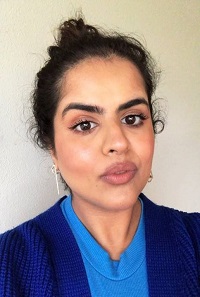Safiah Rind is a Yamatji-Badimaya woman, born and raised in Perth but has connections in Geraldton and Magnet. Safiah has a background in film, documentary and photography and is currently finishing her Masters of Arts at Curtin University and completing her film project. "Growing up I always thought I wouldn't be as excited for Eid compared to when I was a kid, but this hasn't been the case. "For me, Eid is waking up to your dad ironing his favourite clothes, your mum walking around with a face mask on, your sister frantically baking (without any prior experience but it's a blessing to eat something sweet as your first food of the day), your brother having a smoke in the backyard, your random uncle that crashed the night before, and guests rocking up at 8am, after walking from Eid prayer from the Islamic school which was so conveniently close to your home (dad's idea). "All these small things add up and make Eid, Eid. "I get excited every year—twice a year thankfully—where I get to taste my sisters failed baking experiment and spend time with family." Coming from a large family, Eid was always an important part in getting Safiah's family together to celebrate. "It means we get to acknowledge the places we've come from, the people that we are and the people we pray and hope to be. "Eid isn't just a day where we get to celebrate twice a year, it's much more important that. Having a Yamatji-Badimaya background and also being Persian meant that Eid had to signify the different aspects of both of those identities and cultures. "It meant acknowledging the connection with the lands we have in Geraldton to Mount Magnet while also celebration our religious and cultural identities. "Sometimes on Eid we would drive up to Geraldton and visit my great grandmother's grave, to thank her for her sacrifices. For some people this might be a sad and gloomy activity on a day of celebration, but for us it wasn't. We get to pray and spend time on the lands she walked, prayed and spent her life on. "For most Eids we do a huge picnic, with all the people in the family and after that, as a sign of respect, we go to our older aunty's house, where she hosts dinner for everyone. She's nearly 80, but she still loves doing it. "It's a really special time for all of us." |